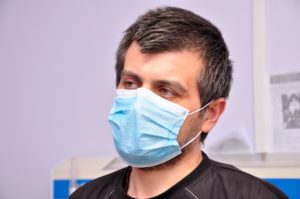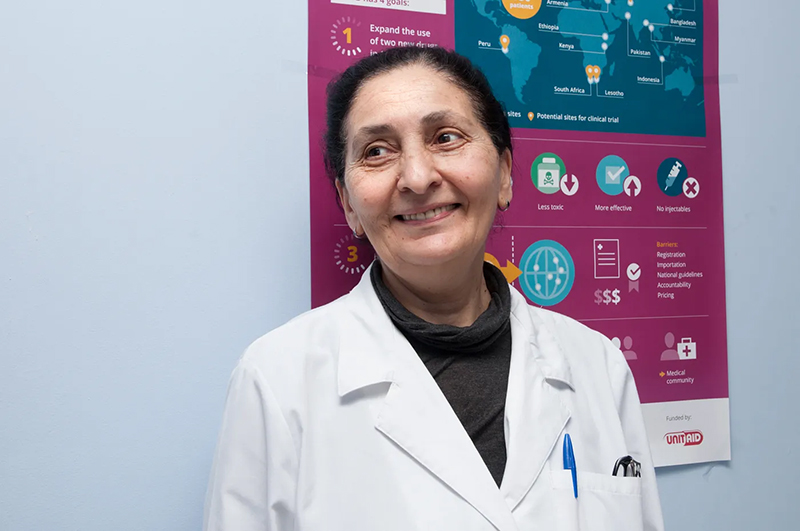Geneva – World TB Day, 24 March, marks the day in 1882 when the bacteria that causes tuberculosis was discovered. In 2023, 131 years after that discovery, TB remains a leading cause of death from infectious disease, surpassed only recently by the COVID-19 pandemic.
Today, Unitaid is joining WHO and other leading global health actors in calling for rapid adoption of regimens for drug-resistant strains of TB that more effectively cure patients while drastically reducing the time required for treatment.
TB elimination efforts have long been stymied by insufficient funding, attention, and political will, leaving healthcare systems to rely on ineffective diagnostic methods, outdated treatments, and a critical lack of awareness. These dangerous gaps have created a space in which drug-resistant strains of TB could develop and spread, largely unchecked.
In 2021 alone, 10.6 million people fell ill with TB and half a million of them developed a strain of the disease that does not respond to some, many – and in severe cases, most – of the drugs available to treat it.
Reinvigorated research into new medicines and regimens to treat TB paved the way for the development and testing of several novel regimens over the past decade, helping advance improved treatment options for people suffering from drug-resistant TB.

Photo caption: When Ramaz checked into the hospital with XDR-TB, he didn’t expect to survive. New medicines changed everything. Photo credit: Mzia Lekveishvili/Unitaid
When Ramaz was 34 years old, he checked into a hospital in Georgia with extensively drug-resistant TB (XDR-TB), a strain of the bacteria that had grown resistant to all available medicines used to treat TB. It was 2016. He had been in treatment for multidrug-resistant TB (MDR-TB) since 2010 but had to stop treatment twice because of the severe and toxic side effects it caused him.
Drug-resistant TB takes a heavy toll on patients, communities, and healthcare systems. Conventional treatments used at the time could last up to two years, cause terrible side effects like permanent hearing loss and kidney failure, require thousands of pills and painful injections, and cost several thousands of dollars per person. XDR-TB is particularly severe and, until recently, nearly incurable.
“I never thought I could survive this disease,” said Ramaz, who thought he was saying goodbye to his wife and daughters when he entered the hospital that day.
But new medicines for treating TB – the first to be developed in almost half a century – helped enable Ramaz’s remarkable recovery. He was treated through Unitaid’s endTB program, which is working to develop and advance a number of shorter, more effective, less toxic, injectable-free, and more affordable treatment regimens for drug-resistant TB.
TB treatment requires a combination of antibiotics, so new drugs need to go through rigorous testing to prove their safety and efficacy when used alongside other medicines. The endTB program – Unitaid’s largest investment and longest running initiative to date – began as a commitment to generate gold-standard evidence to back up the use of two novel drugs – bedaquiline and delamanid – and improve treatment options.
As part of the program, a massive observational study conducted across 17 countries helped shape a WHO recommendation for a nine-month, all oral treatment regimen for MDR-TB. These guidelines from the WHO are a critical step in ushering in changes in country-level TB programs, and introduction of the treatments through endTB helped enable rapid uptake. Later this year, endTB clinical trial results will provide critical insight to guide the use of new and repurposed medicines across diverse populations, including people in treatment for HIV, diabetes, and hepatitis C, as well as in pregnant women and children, who are often excluded from studies.
These new developments come at a time of relative progress in TB, after decades of stagnation. The emergence of bedquiline and delamanid were followed by additional drug developments, including pretomanid, which contributed another highly effective treatment option to the fight against TB.
“We have seen a complete revolution in treatment over the past decade,” says Dr Philippe Duneton, Executive Director of Unitaid. “Before this work began, MDR-TB treatment was not only long and difficult – it was largely ineffective. Today, we’re seeing people make complete recoveries in a fraction of the time, even for people infected with severely resistant strains of TB.”

Photo caption: Dr Barbakadze is one of many doctors involved in Unitaid’s endTB program who has witnessed the impact of new TB medicines on severely ill patients. Photo credit: Mzia Lekveishvili/Unitaid
“Nobody thought Ramaz would survive,” says Dr Ketevan Barbakadze, who heads up the MDR/XDR-TB department in Tbilisi where Ramaz received treatment. “And we have plenty of similar stories.”
She says the introduction of these new medicines has had a true “Lazarus effect,” referring to the rare phenomenon when a person who seems to be dead suddenly shows signs of life again.
But despite significant improvements in patient outcomes observed with the new treatments, many people living in countries with the highest rates of TB remain without easy access to these medicines.
The first-ever United Nations High-Level Meeting on TB held in 2018 set bold five-year goals to reduce the burden of disease worldwide. But efforts are falling far short of reaching the target 1.5 million people affected by drug-resistant TB by 2022 and disruptions and delays caused by the COVID-19 pandemic threaten to reverse 20 years of progress made against TB.
New treatments, though significantly more affordable than previous, less effective regimens, remain in the hundreds of dollars per patient – a considerable expense for countries with limited resources. And the cost of treatment goes beyond medicines – people with TB are often so ill they cannot work, making it challenging to cover their living and treatment expenses.
Diagnosing TB and identifying drug-resistance is also complex. A combination of inadequate or unavailable tools, alongside a lack of awareness about the disease, keeps treatment out of reach for millions of people with TB.
The WHO’s Call to Action advocates for investment and attention to urgently roll out improved treatments, with a focus on ensuring efforts are supported by solutions that improve the quality of care and fight against growing TB drug-resistance.
Unitaid remains committed to efforts to end TB, by leveraging US$250 million in investments to improve treatments and support adherence, facilitate detection, enable access to high-quality preventive medicine, and ensure children, pregnant women, people living with HIV, and all those most affected can access care.
Related publication:
Media contact:
For more information and media requests:
Maggie Zander
Communications Officer
Mobile: +41 79 593 17 74
Email: zanderm@unitaid.who.int